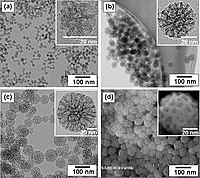
Photo from wikipedia
Lipid-based formulations can circumvent the low aqueous solubility of problematic drug compounds and increase their oral absorption. As these formulations are often physically unstable and costly to manufacture, solidification has… Click to show full abstract
Lipid-based formulations can circumvent the low aqueous solubility of problematic drug compounds and increase their oral absorption. As these formulations are often physically unstable and costly to manufacture, solidification has been suggested as a way to minimize these issues. This study evaluated the physicochemical stability and in vitro performance of lipid-loaded mesoporous magnesium carbonate (MMC) particles with an average pore size of 20 nm. A medium chain lipid was loaded onto the MMC carrier via physical adsorption. A modified in vitro lipolysis setup was then used to study lipid release and digestion with 1H nuclear magnetic resonance spectroscopy. The lipid loading efficiency with different solidification techniques was also evaluated. The MMC, unlike more commonly used porous silicate carriers, dissolved during the lipolysis assay, providing a rapid release of encapsulated lipids into solution. The digestion of the dispersed lipid-loaded MMC therefore resembled that of a coarse dispersion of the lipid. The stability data demonstrated minor degradation of the lipid within the pores of the MMC particles, but storage for three months did not reveal extensive degradation. To conclude, lipids can be adsorbed onto MMC, creating a solid powder from which the lipid is readily released into the solution during in vitro digestion. The chemical stability of the formulation does however merit further attention.
Journal Title: Pharmaceutics
Year Published: 2020
Link to full text (if available)
Share on Social Media: Sign Up to like & get
recommendations!